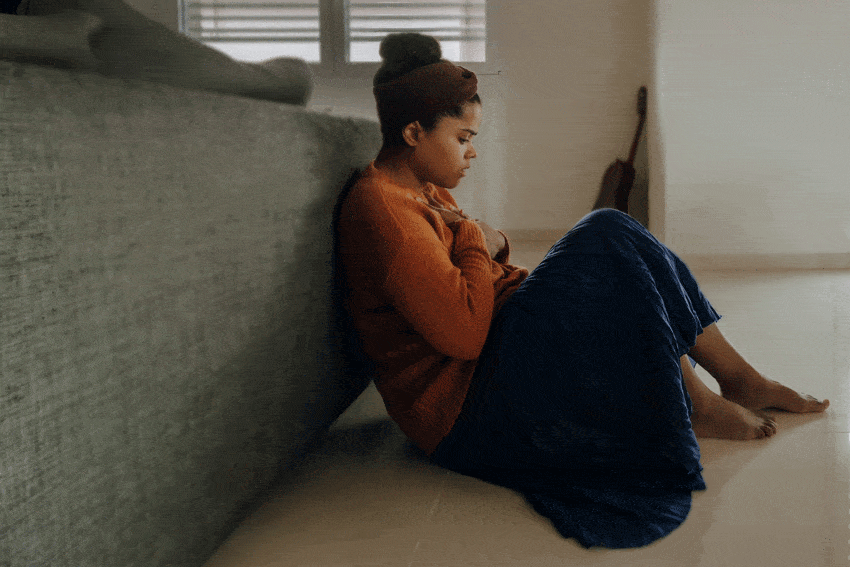
Confusing feelings and distractions in prayer can teach us
I had a baffling prayer experience the other morning. In retrospect, the solution was fairly obvious, but I’m sharing it with you anyway, in case you’re going through something similar. Here is what happened.
For once, I had gotten a decent amount of sleep, I had a manageable amount of work ahead of me, and I had just dropped the kids off at school, and so, feeling fresher and more ambitious than I had in weeks, I realised that the 20-minute drive home was the perfect time to say my morning prayers like a good Catholic for once in my life. So I launched in, starting with a morning offering and then working my way through a rosary, offering up a Hail Mary for each of my family members. Now what could be wrong with that?
Nothing good can come from deciding not to pray.
What was wrong was that by the time I was done, I was a wreck. My heart was pounding, my breath was ragged and shallow, and my stomach was in painful knots. Every time I said a Hail Mary, I brought my intentions to the Blessed Mother, and that meant putting into words my worries and fears about everyone I loved. And I have a lot of worries and fears, lately. So putting all of it into words was like diving into a pit. I made a few feeble attempts to say, ” . . . and I offer all of this up to God!” but it was too late. By the time I got up to the final “amen,” my peace of mind was absolutely shattered, and it had come about through prayer, of all things.
This does not usually happen to me. Usually, prayer is the one way I have some shot at grounding my day and finding some peace; and usually, intercessory prayer is my main form of prayer that leads into all other kinds of prayer. I start with intercessory prayer because, yes, it helps me know I’ve done my job and brought other people to Jesus, but it also because it brings me to a place of peace where I can dwell on God’s goodness and mercy, and ask forgiveness for my share, and thank him for the gifts He has already given us, and I can make acts of hope and faith and all kinds of salutary virtues.
For me, for better or worse, all kinds of prayer naturally begins with intercessory prayer: Just telling God what I need, for myself and for other people, and asking Him for help, in simple conversation, like I’d talk to anyone. That’s always worked for me, or at least it hasn’t hurt. But not this time!
It was alarming, to say the least. It was like finding out that fruits and vegetables are actually poisoning you, or a good night’s sleep will make you weak and exhausted. If prayer was going to make me fall apart, now what was I supposed to do?
The first thing I did was to allow myself to take this problem seriously, and not just yell at myself to snap out of it. While it’s true that the purpose of prayer is not to elicit a specific emotional response, and you’re not guaranteed a sensation of peace when you pray, it’s also true that emotional distress is real distress, worth paying attention to. If prayer does elicit a powerful emotional response that’s harmful to you, you can’t just ignore that. It’s worth taking seriously.
One way of taking it seriously is to simply to not do much intercessory prayer right now. There are lots of other kinds of prayer, and just because I’ve always done it a certain way doesn’t mean I always should. I can focus on prayer of adoration, I can meditate, I can pray the Psalms or the Liturgy of the Hours, and so on.
Another solution would be to simply mention the names of the people I want to pray for, or even just descriptors like “my family” or “my online friends” and make an act of childlike trust that God knows exactly who I mean and exactly what they need. This is probably actually a better approach than trying to direct the Holy Spirit to pay attention to exactly the issue that I think is most important. Less yackity-yacking, and more quiet resting in Jesus, cannot possibly be a bad thing.
Meet Jesus in the suffering of anxiety
Another approach is to take a closer look at why I’m having such a strong emotional response to articulating the needs of everyone around me. Obviously it’s because I care about them, but it may also be a sign that (like so many people right now) I’ve reached some kind of breaking point.
Maybe I’m feeling guilt over how I’m responding to them, or feeling like I’ve caused some of these problems; maybe I’m just overwhelmed at how much need there is. Either way, this distress is a real kind of suffering, and it means I need healing, too. So I could present my shattered, anxious self to the Holy Spirit and ask for guidance and healing for myself. Ask to meet Jesus right there, in the suffering of anxiety and vulnerability.
I do know that the answer cannot be to stop praying. I don’t usually make New Year’s resolutions, but this year I did decide that I was going to spend some time in prayer every single day, even if it was literally only for a few seconds.
Sometimes bad things happen when we pray, but we can learn from it. Nothing good can come from deciding not to pray. So that’s the one thing I’m not going to do.
Related:
